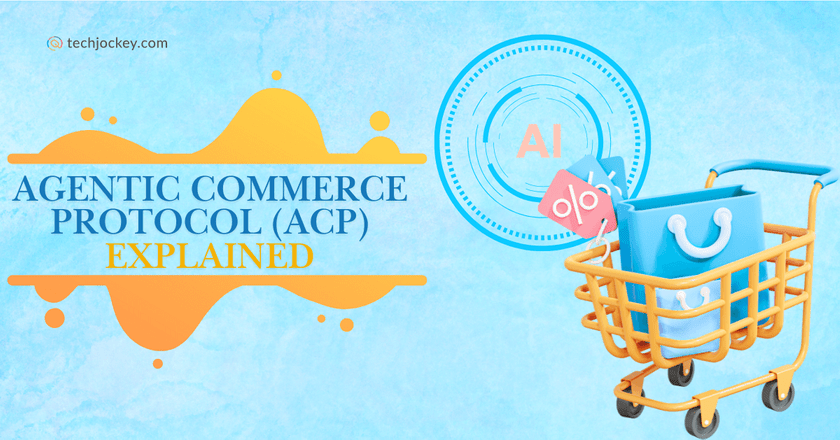How Agentic Commerce Protocol Transforms E-Commerce: Features, Benefits & Challenges

Online shopping is changing fast. With the advent of AI assistants, in fact, the way we find, compare, and buy products online is being entirely redesigned. At the center of this change is the Agentic Commerce Protocol (ACP), a smart system made by OpenAI and Stripe.
ACP lets Agentic AI Tools like ChatGPT connect directly with online stores, so users can shop just by chatting. They are no longer required to switch tabs or fill out forms but just focus on shopping.
Let’s take an in-depth look at this feature to understand its intricacies better and shed a much-needed light on how it is reshaping the future of e-commerce once and for all.
What is Agentic Commerce Protocol (ACP)?
ACP is an open system that lets AI assistants act like personal shoppers. It is a commerce framework built using multi-agent AI principles, while multi-agent AI is the broader underlying technology behind it. It connects buyers, AI agents, and stores using secure APIs. This setup moves shopping from manual browsing to chat-based experiences.
ACP works differently from regular online shopping. Instead of searching many websites, with it your AI assistant can quickly find products, compare them, even negotiate, and complete the purchase for you.
A special feature of ACP is secure payments using tokens. This means your card details are never shared with stores or AI tools. Stores still manage their products, orders, and delivery, while shoppers enjoy a smooth and interactive experience.
ACP is built to be easy for all kinds of retailers to use. It doesn’t need big changes to their current systems. This open design helps AI assistants connect with stores and unlock smarter, faster shopping for users.
How Does Agentic Commerce Protocol (ACP) Work?
The ACP-enabled shopping process involves three main participants…
- User: You state what you want to buy or describe your preferences.
- AI Agent: The smart assistant interprets your requests, explores multiple merchants for products matching your criteria, and guides you through options.
- Merchant & Payment Processor: These handle the inventory, pricing, payment capture, and delivery logistics as usual, but through ACP’s APIs.
Merchants set up special web links (called RESTful endpoints) that let AI agents do things like start or update a checkout, change shipping or payment details, confirm or cancel orders, and share tracking info after a purchase.
When you decide to buy something, your AI assistant sends a secure token to the payment system to finish the purchase without sharing your card details. This token system works through partners like Stripe, which already supports ACP well.
The AI assistant creates a chat-based interface that shows products, shipping options, and total prices in real time during checkout. Everything happens smoothly inside chat or voice apps, removing the need to deal with slow websites or confusing layouts.
Suggested Read: AI Shopping Agents: The Future of Smarter Online Shopping
How ACP is Changing Online Shopping?
ACP revolutionizes e-commerce by embedding the entire shopping experience inside conversations…
- Speed: AI assistants search millions of products across many stores at once, saving time compared to browsing page by page.
- Simplified Checkout: No need to visit different sites or enter payment info repeatedly, just complete purchases through chat or voice in seconds.
- Personalized Picks: AI learns your shopping habits to suggest better products and avoid irrelevant ones.
- Wider Access: You get easy access to more stores without switching between apps or websites.
- Secure Payments: Token-based payments protect your card details and reduce fraud risks.
- Fewer Drop-offs: Fast, smooth chat-based shopping keeps users engaged and less likely to abandon their carts
Advantages of Agentic Commerce Protocol (ACP)
The ACP framework provides significant benefits, including…
- Time Savings: By automating product search, comparison, and payment, users avoid hours spent browsing.
- Convenience: Shopping through chatbots or voice assistants integrates naturally with everyday habits.
- Security: Payment tokenization and strict API standards reduce exposure to card theft or phishing.
- Increased Merchant Reach: Retailers can connect directly with buyers embedded in AI platforms, growing their audience.
- Personalized Shopping Experiences: Constant learning by AI agents improves relevance and reduces choice overload.
- Operational Continuity: Merchants retain full order control, inventory handling, and customer communication, enabling smooth post-sale care.
Limitations of ACP
Despite its clear benefits, ACP still faces several challenges. Getting merchants on board is one of them, since not all sellers support ACP APIs, and setting up secure, reliable connections needs skilled developers.
Another issue is user trust as some shoppers may feel unsure about letting AI agents handle payments and make buying decisions on their behalf.
Data privacy is also a major concern. Sharing shopping preferences and payment tokens requires strong encryption and must follow legal rules. Building AI agents that truly understand complex shopping needs and personal preferences is another tough task.
Also, current laws around online shopping may need updates to fully support purchases made by AI agents.
The Future of Agentic Commerce Protocol (ACP)
ACP is poised for growth shaped by a few trends, such as…
- Wider Industry Adoption: Platforms like Shopify and payment processors like Stripe are actively integrating ACP tooling, expanding merchant participation.
- Smarter AI Assistants: Agents will better understand speech nuances, anticipate needs, and offer more precise product suggestions.
- Multimodal Interfaces: Voice shopping and AR experiences integrated with ACP will make buying immersive and effortless.
- Privacy Enhancements: Better encryption, anonymous data handling, and clear user consent tools will help make shopping safer.
- Global Expansion: Updates to the protocol will support complex international purchases, including different currencies and tax rules.
- New Business Models: Entirely new ways to shop may emerge, like peer-to-peer sales handled fully by AI agents using ACP standards.
Conclusion
The Agentic Commerce Protocol (ACP) sets a new standard for online shopping, where AI assistants handle everything, right from product discovery and comparisons to secure payments, all within chat or voice platforms. It blends artificial intelligence with retail to create an easy shopping experience that removes manual steps and reduces hassle for buyers.
For both customers and businesses thus, ACP marks a shift toward smart, conversational commerce that’s likely to shape the future of how people buy and sell online.
Yashika Aneja is a Senior Content Writer at Techjockey, with over 5 years of experience in content creation and management. From writing about normal everyday affairs to profound fact-based stories on wide-ranging themes, including environment, technology, education, politics, social media, travel, lifestyle so on and so forth, she... Read more




























